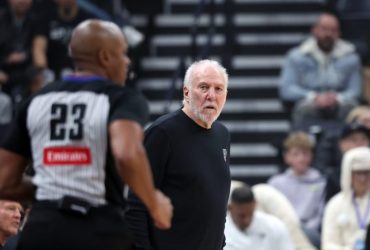The next time you’re driving your son or daughter to their game, and you see them engrossed in their phone, Larissa Mills wants you to remember something.
“The brain takes 22 minutes to go back to refocusing,” she tells USA TODAY Sports. “We’ve wasted an inning, a period, a half on poor decision-making skills. So why did you bother? Don’t even go on the ice, as far as I’m concerned.”
We focus so much on getting our kids ready to play through relentless practice and personal training outside the team. But do we underestimate the power of developing what’s inside of them?
Mills directs the London, Ontario-based Mental Game Academy. She holds degrees in sociology, psychology and education. She’s also a mother of three who has mined the mental side of thousands of athletes from the youth through professional levels in the United States and Canada.
And she has kept a close eye on you.
“Our children are on a phone from four to eight to 12 hours a day,” she says. “When are they learning their psychological skills? They’re not, and parents are on their phones for four to nine hours a day. So, when are parents connecting? When are children learning their self-identity? When are they learning how to cope and not get angry and pummel people?
“I just watched a hockey dad get off the ice and hit two refs, kids, 14 years old. And I just saw a fight in an arena two weeks ago.”
The Mental Game Academy helps athletes develop emotional and social awareness while getting us to understand how much of a stake we have in that process.
“Phones are one problem,” she says. “Parents not teaching mental skills is the other problem.”
“Mental game” can give anyone an edge, regardless of your age or athletic level. In some cases, it can propel you to the heights of collegiate and professional achievement. For younger athletes, it can unlock your full potential.
“People say kids have changed,” Mills says. “No, kids have not changed. We’ve lowered our standards. Let’s acknowledge that when we reduce behavioral issues, we raise the level of performance.”
She offers five ways we can help our kid athletes develop a powerful psychological game:
‘Dopamine makes us dopey’
Create phone routines to help calm our nervous system and make us confident.
Dopamine is a neurotransmitter that acts as a chemical messenger between the nerve cells and the rest of your brain. According to the Cleveland Clinic, high amounts of dopamine are released through experiences your body finds pleasurable. They can also stimulate addictive habits.
“Dopamine makes us dopey and slower, makes our brain feel like it’s in oil,” Mills says.
Phone use, she says, can surge dopamine and cortisol, a hormone released by our adrenal glands, resulting in lower confidence and sluggish decision-making.
Mills compares looking at your phone before a game to eating poutine, the heavy Canadian delicacy of French fries, cheese curds and brown gravy.
“That’s the same thing you’re doing when you tell your brain negative things, or you watch a phone before a game or practice,” she says. “You’re destroying your nervous system. … The symptoms from phone addiction are almost identical to those of anxiety.”
Children touch a phone, Mills has determined through American, Canadian, British and Australian resources, about 176 times per day.
We can’t entirely stop using our phones, which are our line of communication with our kids. Instead, choose a few times a day where, in short bursts of time, you return calls and answer your text messages.
For at least one hour a day, put your phones away and interact with your kids: Share a meal or take it outside.
‘I want you to control your phone,’ Mills says. ‘Don’t let the phone control you. The brain, if it gets zapped 176 times a day, this is where we get burnout from.
“Kids need to be bored and go play. Our brains are simply not designed to be on tech. They’re designed to talk and walk, so psychologically, we’re kind of stunting the development.”
Coach Steve: American kids got a D- in physical activity. What can we do about it?
Teach youth athletes: social media ‘tanks’ performance
Mills prohibits athletes under her care from using their phones two hours before a game or practice and one hour before bedtime.
How do phones and social media impact performance?
“It just tanks it,” she says.
Within 30 seconds of scrolling, Mills says, our brains can automatically rewire what we think is an enjoyable experience to one that is negative.
“Social media makes us compare ourselves to everyone else online,” she says. “This is an automatic. It’s called a defense mechanism. So then all of a sudden we’re like, ‘I’m not fast enough, I’m not good enough, I’m not smart enough, my stats aren’t good enough. Why is his reel getting more likes than mine?’ It just starts this spiraling-out-of-control emotion that kids don’t have the stoppers for.”
She hears from athletes who tell her decreasing their phone time to less than two hours a day helps them train harder but also helps them be more social. School is also easier.
“Of course it is, because your cognitive processing is moving three times faster than it was last week,” Mills says. “A volleyball coach called me yesterday and said, ‘Larissa, I don’t know what you did, but they’re all really aggressive now.’
“When we increase confidence, aggression and fearlessness take over.”
‘I am power’: Teach youth athletes effective self-talk
Staying mentally strong gets trickier when we’re all alone on a golf course or sitting in a dugout. What goes through our minds before we take our next stroke or throw our next pitch can fuel our performance.
Use the time to plan your attack. Remember when you sunk that same putt in practice. Visualize yourself poking an outside pitch to right field for a hit or driving an inside one to the left-center field gap.
See yourself throwing all of your pitches to the exact locations you want them.
“Once they’re ready, these kids are killing that,” Mills says. “The kids that are on their phones in the dugout, they’ll just come right back out and make a mistake. Their brain will be very, very unsettled.”
We know even the slightest amount of success can elevate kids’ confidence. Mills has her athletes create personal mantras we can repeat to ourselves that elevate it: I am power, I am speed, I am impactful.
Have your younger kids, or your Little League team, say them out loud in practice. With repetition, it can become your cognitive flow while playing.
‘No one can get in my head’
In order for athletes to perform, they must stop negative self-talk. It starts with what they hear from parents on the sidelines.
When we sense negative thoughts creeping in – from a teammate trying to get an edge during tryouts or an opponent trying to rattle us in a game – we are the ones responsible for fending off those thoughts. Be intentional and forceful to yourself about it.
“No one can get in my head,” we can tell ourselves. “You guys stay the hell out of my head.”
Social media can manufacture negativity, even in NHL players.
“Why are you looking online after your games?” Mills sometimes has to tell her higher-level athletes. “You make $10 million a year. Don’t compare yourselves. And all these idiots out there that want to be you are judging you, and they have no place to judge you. The only person who should be looking at you for feedback is you and your coach. That’s it. The rest of the world does not matter.”
But what if our parents are the voice of those thoughts? About 60% of the kids that come to see Mills and her associates say their parents negatively impact their sport.
“I cannot believe the amount of parents coaching from the sidelines and have ruined their kids’ experience,” she says. “They can’t hear you, and if they do hear you, what you actually do is sabotage them.
“It makes them play much worse, because now their brain is in yellow in their traffic light, and they’re like, ‘Oh crap, mom and dad are really concerned if I perform.’ Our instincts to pass the ball, kick the ball, shoot the ball, if we follow (them), we’re more likely to perform better than if we think about what a coach or a parent wants us to do.”
When we yell at them, they shut down even further. Instead, stick to confidence boosts.
“Once parents hear this conversation, the relationship usually gets better between parent and child,” Mills says.
Coach Steve: Ranking the worst behaved youth sports parents
Mastering performance means mastering control of your emotions
Mills specializes in untethering and empowering teens who have spent more than 18,000 hours on their phones by age 16.
“More kids today are just not able to be coached because they have the attention span of six seconds,” she says. “They don’t know how to track, they don’t know how to get feedback. They think criticism and feedback are yelling. They are not. And coaches are having a problem. They can’t use the D-word or the C-word, which is discipline or consequences.”
Adopting a phone regime for your kid is the first step. Then, we need to encourage them to converse with others in real time. Have them talk to the center and forwards they may not know very well but line up next to on the ice. Have them shake the hand of an opponent or referee and strike up a conversation.
Have them accept constructive criticism from the coach, even if you loudly disagree with it from the bleachers.
“There are always weaknesses in teams,” says Mills, who coaches volleyball. “Who are you going to get to go offline, or who you’re going to get to horse collar? Don’t give into baiting. You have to be mentally strong and be able to do and see all that. But many kids just get baited, and they don’t think about the team. And so, they get called on the penalty.”
As Mills says, we need to be aggressive as athletes, but we naturally are when we’re more calm.
When we control ourselves, we not only help our teammates, but we set personal boundaries that can carry us throughout life.
Jeff Nelligan, a father of three sons and author of a book on sports parenting who has been a guest on Mills’ podcast, says this is perhaps her most poignant lesson.
“She is like an evangelist in talking about developing youths who are steadfast in following through on anything,” he says, “ones who are courteous and respectful, who are leaders.”
(This story was updated to add new information.)
Steve Borelli, aka Coach Steve, has been an editor and writer with USA TODAY since 1999. He spent 10 years coaching his two sons’ baseball and basketball teams. He and his wife, Colleen, are now sports parents for two high schoolers. His column is posted weekly. For his past columns, click here.








